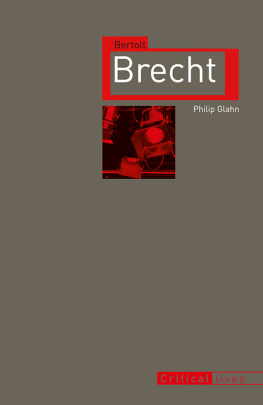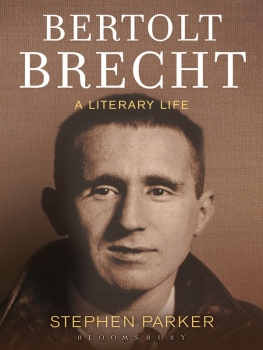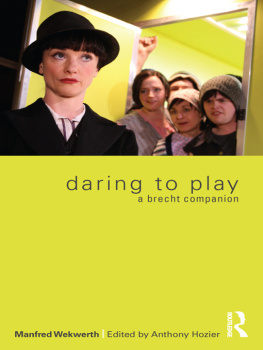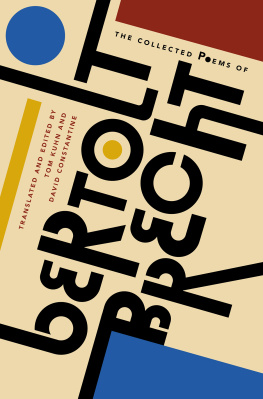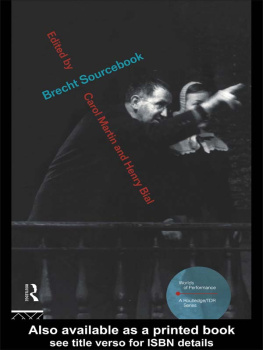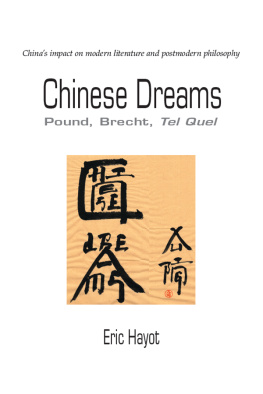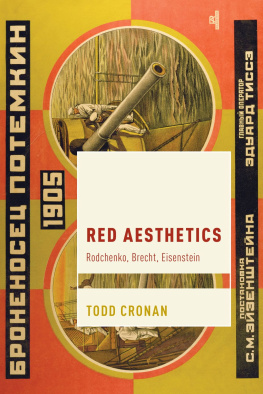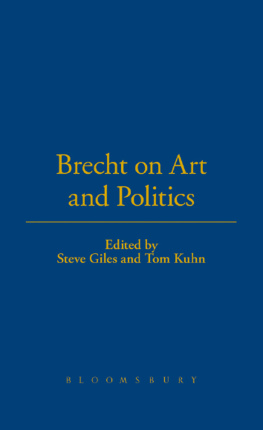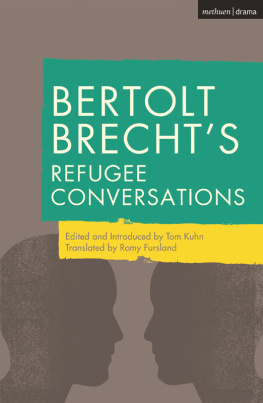Bertolt Brecht

Titles in the series Critical Lives present the work of leading cultural figures of
the modern period. Each book explores the life of the artist, writer, philosopher
or architect in question and relates it to their major works.
In the same series
Georges Bataille Stuart Kendall Charles Baudelaire Rosemary Lloyd Simone de
Beauvoir Ursula Tidd Samuel Beckett Andrew Gibson Walter Benjamin Esther Leslie
John Berger Andy Merrifield Jorge Luis Borges Jason Wilson Constantin Brancusi
Sanda Miller Bertolt Brecht Philip Glahn Charles Bukowski David Stephen
Calonne William S. Burroughs Phil Baker John Cage Rob Haskins Fidel Castro
Nick Caistor Coco Chanel Linda Simon Noam Chomsky Wolfgang B. Sperlich Jean
Cocteau James S. Williams Salvador Dal Mary Ann Caws Guy Debord Andy
Merrifield Claude Debussy David J. Code Fyodr Dostoevsky Robert Bird Marcel
Duchamp Caroline Cros Sergei Eisenstein Mike OMahony Michel Foucault David
Macey Mahatma Gandhi Douglas Allen Jean Genet Stephen Barber Allen Ginsberg
Steve Finbow Derek Jarman Michael Charlesworth Alfred Jarry Jill Fell James Joyce
Andrew Gibson Carl Jung Paul Bishop Franz Kafka Sander L. Gilman Frida Kahlo
Gannit Ankori Yves Klein Nuit Banai Lenin Lars T. Lih Stphane Mallarm Roger
Pearson Gabriel Garca Mrquez Stephen M. Hart Karl Marx Paul Thomas
Eadweard Muybridge Marta Braun Vladimir Nabokov Barbara Wyllie Pablo Neruda
Dominic Moran Octavio Paz Nick Caistor Pablo Picasso Mary Ann Caws
Edgar Allan Poe Kevin J. Hayes Ezra Pound Alec Marsh Marcel Proust Adam Watt
Jean-Paul Sartre Andrew Leak Erik Satie Mary E. Davis Arthur Schopenhauer
Peter B. Lewis Susan Sontag Jerome Boyd Maunsell Gertrude Stein Lucy Daniel
Richard Wagner Raymond Furness Simone Weil Palle Yourgrau Ludwig Wittgenstein
Edward Kanterian Frank Lloyd Wright Robert McCarter
Bertolt Brecht
Philip Glahn
REAKTION BOOKS
To Nell
Published by Reaktion Books Ltd
33 Great Sutton Street
London EC1V 0DX, UK
www.reaktionbooks.co.uk
First published 2014
Copyright Philip Glahn 2014
All rights reserved
No part of this publication may be reproduced, stored in a retrieval system, or transmitted, in any form or by any means, electronic, mechanical, photocopying, recording or otherwise, without the prior permission of the publishers
Page references in the Photo Acknowledgements and
Index match the printed edition of this book.
Printed and bound in Great Britain by Bell & Bain, Glasgow
A catalogue record for this book is available from the British Library
eISBN: 9781780233017
Contents
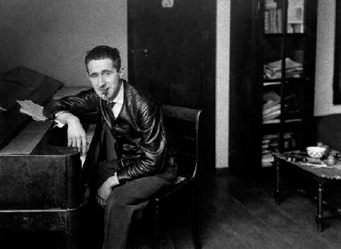
Brecht in Berlin, 1927.
Introduction
Throughout his life and work, Bertolt Brecht demanded that all artistic action, especially his own, be useful: not only practical and applicable for the people who make up its public, but also relevant to them in their respective times. Brechts own ongoing actuality and usefulness lie in his continuing struggle with history as an evolving, emancipatory immersion in the processes of producing narratives and experiences, images and fantasies. This book is an account of Brechts work and life pursued from the core of his belief that theory and practice, the ideal and the real, art and life, need to be understood in their interdependent relationality, a position of tension and movement from which to see and act, learn and teach. Brecht historian Hans Mayer observed, One still writes about the epic theatre without having studied its dialectics.that sought to shed light on and at the same time intervene in the ongoing crisis of modern life shaped by capitalist economics, nationalist visions and social utopias.
Brecht is mainly known for his experimental, modernist Epic Theatre and its Verfremdungseffekt, the alienation effect or strategy of estrangement. He wrote in 1927 that the essential point of the Epic Theater is perhaps that it appeals less to the feelings than to the spectators reason. Instead of sharing an experience, the spectator must come to grips with things. At its core, Brechts approach constitutes an attempt to show the viewer the relations of power and the mechanisms of reality, to lay bare the device. His method aims to situate both artist and viewer within and in conscious relation to the historical present in order to illuminate a position of active, critical involvement in the knowing and making of the world. Exposing social norms and truths as historically determined and culturally produced shows them to be malleable and thus sheds an emancipatory light on the viewers own agency.
As Jan Knopf and other historians have pointed out, Brecht was far from the staunch Communist or doctrinaire Marxist that much post-war scholarship made him out to be. Rather, he struggled mightily with his role, and with the analytic and productive tools he sought to apply and distribute. He was concerned with access to the various ways and arenas in which common sense and ideas, attitudes and perspectives are made and communicated. Thus his work included songs and poems, essays and letters, speeches and editorials, short stories and novels, radio broadcasts and films. Rather than tell his audience what to think, he asked them to sing and speak and act along with and against the conventions of making histories and identities. For Brecht, the public sphere, that hallowed ground of bourgeois society, was a space of class contestation, a site where instead of preserving social values and communal ideals, coalitions were to be formed. Brecht took pleasure in finding ways to intervene in, turn around and use as weapons the images, languages and gestures of philosophers and beggars, bureaucrats and thieves, priests and workers, to cleverly pit expectations and customs against one another in order to show the limits of communicative and experiential structure and to subsequently articulate the possibilities of their transformation. The results are scenes, chapters, declarations, rhymes and questions that are at once funny and tragic, technical and moving, popular and complex, always sharp, accessible and full of pleasure for the contradictions of being an active part in the very production of history.
Although most Brecht scholarship is limited to theatre studies, his widespread influence and, often, the misinterpretation of his methods can be traced in Europe and the U.S. through art and theatre to film and social theory. In the late 1930s, the seminal U.S. critic Clement Greenberg praised Brechts poetry and politics for its formal innovation, despite its authors ideological leanings. In the 1950s, Brechts Berliner Ensemble troupe took post-war Paris by storm with productions of Mother Courage and The Caucasian Chalk Circle. Under Roland Barthes tutelage, the journal Thtre Populaire devoted its entire JanuaryFebruary 1955 issue to The Brechtian Revolution. Barthes was himself very much influenced by the German playwrights work, and went on to pen multiple essays on him and credit him as a decisive element in his own intellectual formation and the birth of semiology.a great impact on American artists like Yvonne Rainer. Griselda Pollock and Sylvia Harvey have assessed Brechts considerable influence on the making and study of 1970s British film in general and feminist practice in particular.

